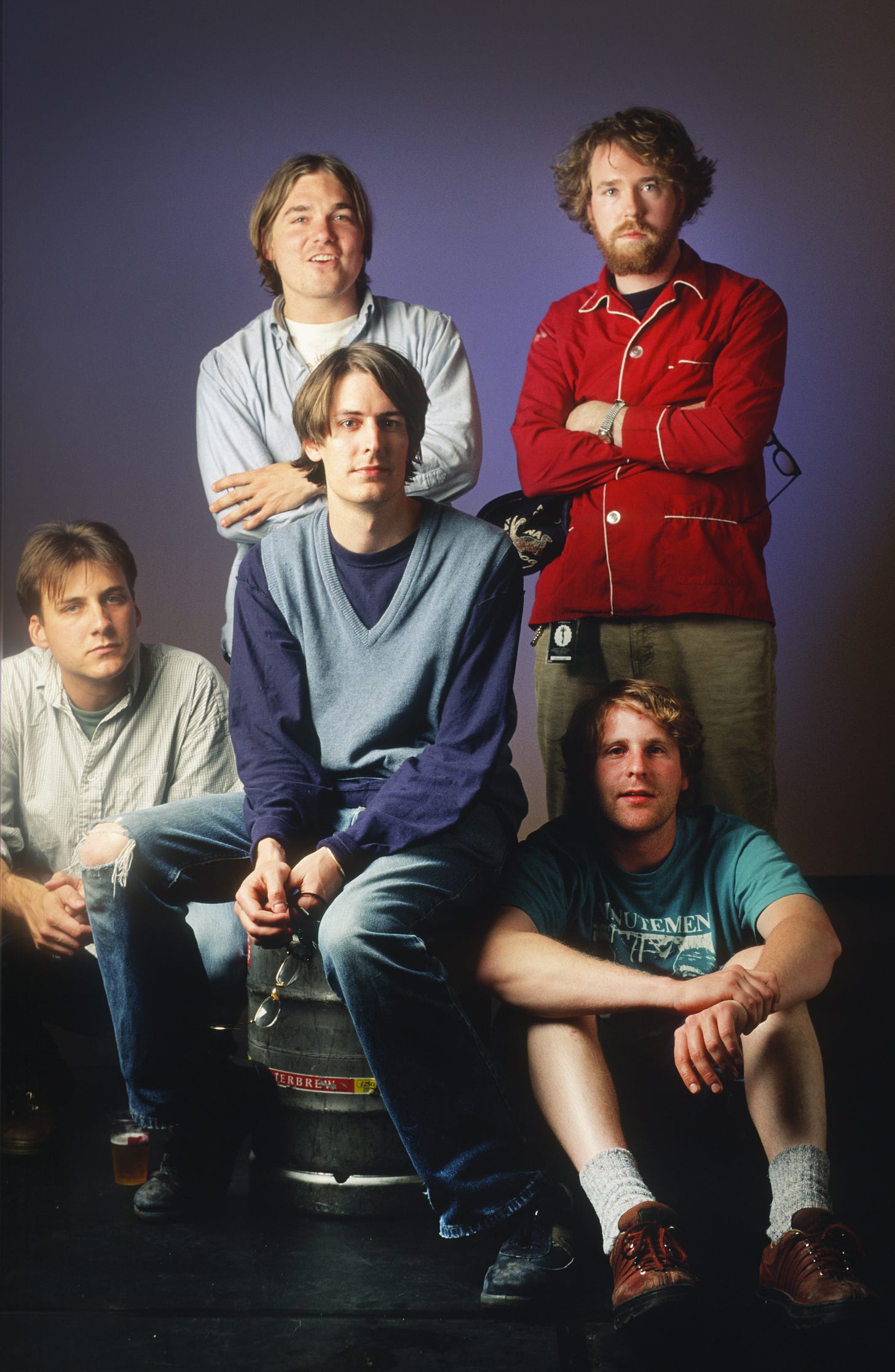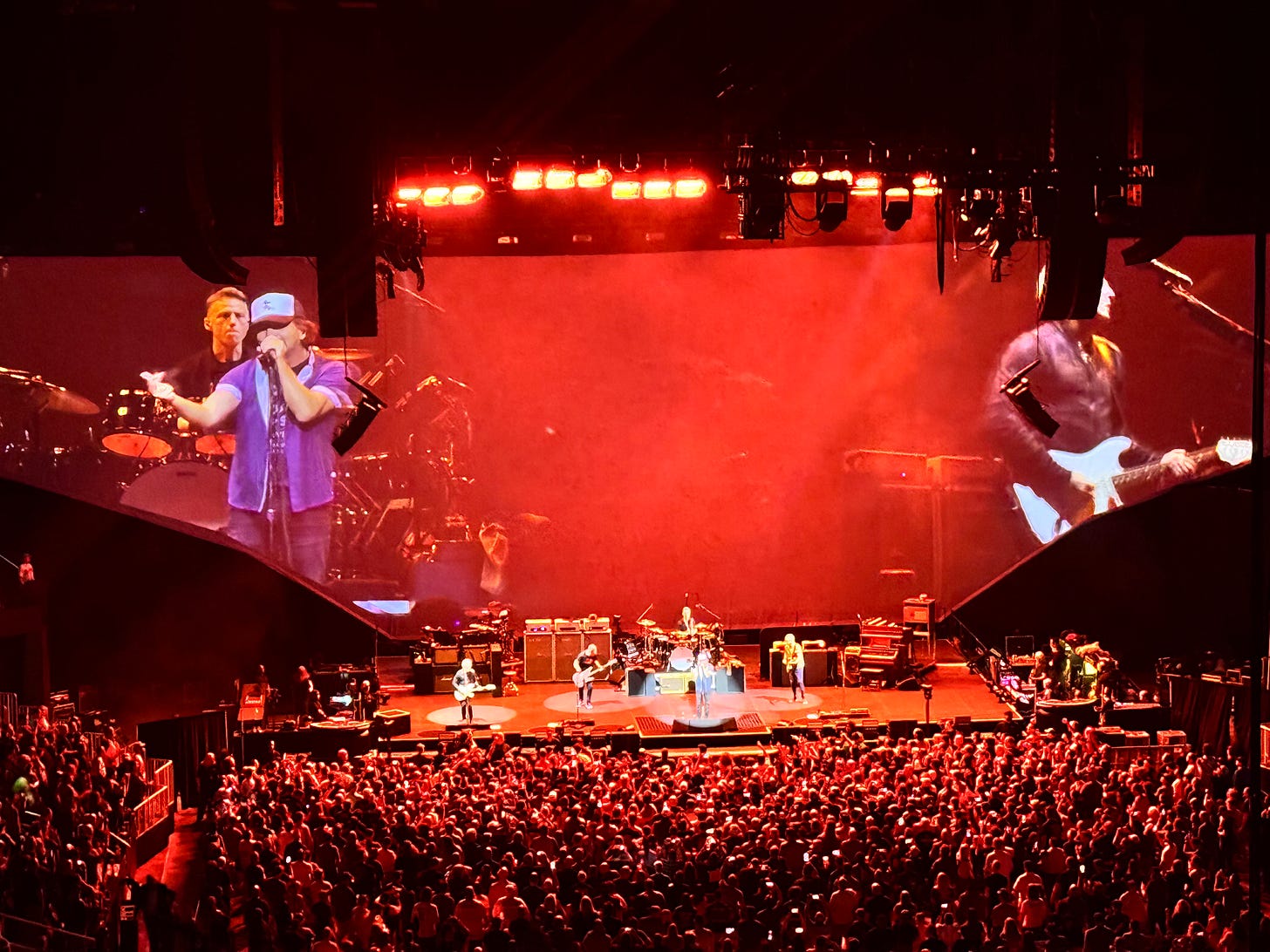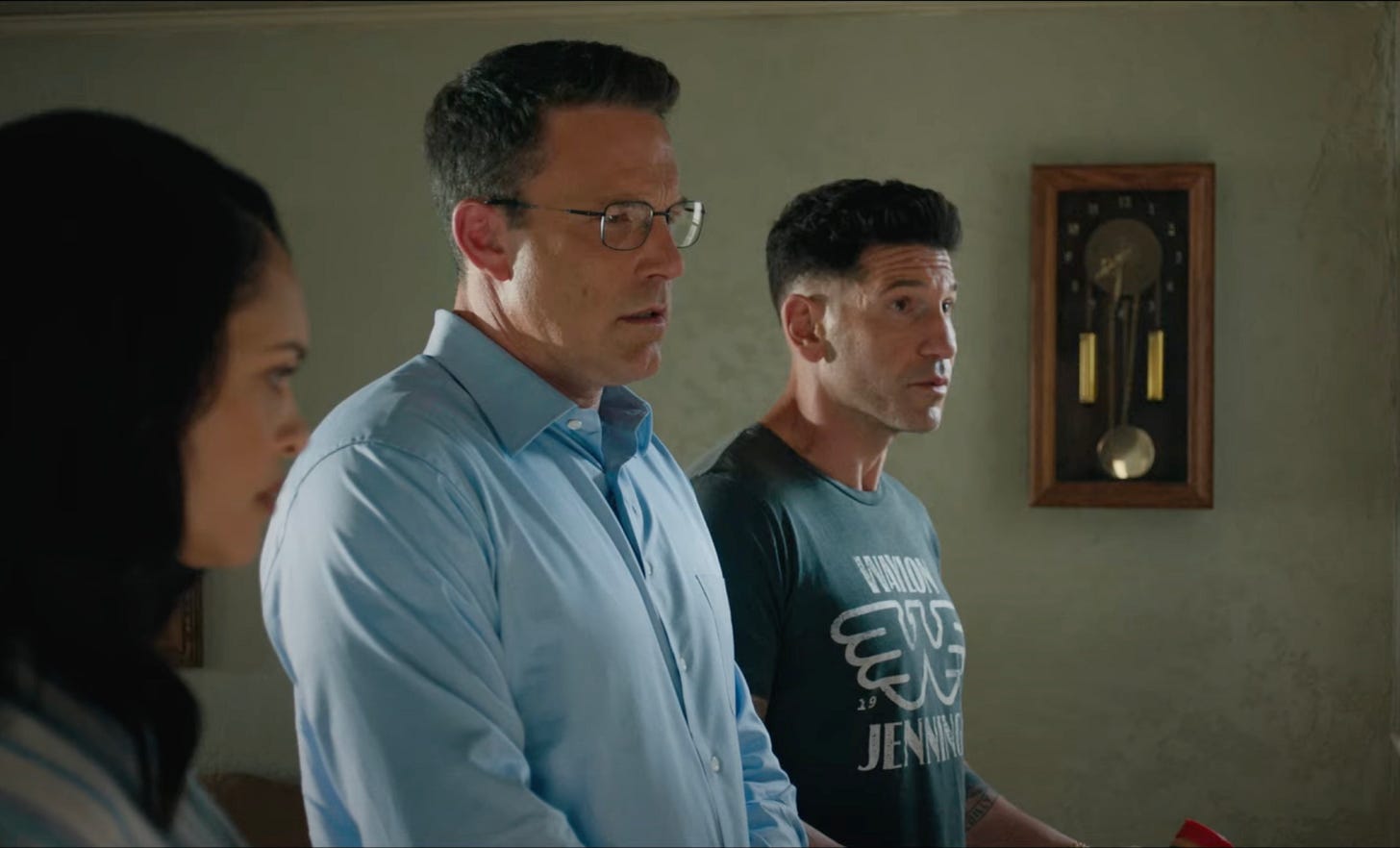My upcoming novel, Lloyd McNeil’s Last Ride, will be released on May 20. I believe you will like it. I hope you will pre-order it. Send me your pre-order receipt and I’ll send you a book plate and enter you into a contest to, like, hang out with me. Details here.
There is a scene in the very strange, deeply fascinating pseudo-documentary Pavements, about the ‘90s alternative rock band Pavement (which opens in various theaters this weekend), in which Stephen Malkmus, the lead singer and creative voice of the band, is preparing for a reunion concert in 2022. The band, rather infamously, has never quite gotten along with one another, leading to some equally infamous on-stage blowups, often because of Malkmus’ prickly moodiness. But Malkmus, while rehearsing, stumbles across an unfamiliar sensation: Satisfaction. “We sound good,” he says.
He then pauses, with a bemused grin. “It’s kind of funny to think that we’re finally getting it right, now that it doesn’t really matter.”
Pavement has to be the best never-was rock band in the world, the signature critics darling (their album Slanted and Enchanted was No. 2 in the Village Voice Pazz and Jop poll in 1992, and Crooked Rain, Crooked Rain held the same spot two years later) during one of the most exciting moments in rock and roll’s history. Pavement was the band that was always about to break big but never quite did. One of the great things about the film—made by Alex Ross Perry, who directed Her Smell and Queen of Earth and is the absolute perfect person to try to wrangle together a documentary about Pavement—is that it unravels any mystery about why Pavement never broke big. Every single time opportunity knocked for Pavement, the band—really, Malkmus—actively ran in the opposite direction. When Nirvana called asking if Pavement wanted to tour with them—at the moment when Nirvana was exploding—Malkmus asked who was going to open for whom. (Nirvana pivoted to the Meat Puppets.) When invited to play “The Tonight Show with Jay Leno,” the band went on and purposely tanked their performance, with Malkmus singing in a voice that makes my eye twitch every time I watch it.
(I still kinda think it sounds great.)
One of the conceits of the film is that Perry, the director, is simultaneously doing: a traditional documentary on the band; opening up a (fake) museum featuring Pavement memorabilia; putting on a (fake) jukebox-style Broadway musical called Slanted! Enchanted! featuring Pavement songs (starring Zoe Lister-Jones and Michael Esper); and a traditional Hollywood biopic, in the spirit of Bohemian Rhapsody, called Range Life, starring “Stranger Things” star Joe Keery as Malkmus, as well as Jason Schwartzman, Fred Hechinger and Tim Heidecker. In one of the best scenes of the (also fake) film, Heidecker, as Matador Records head honcho (and my former blog antagoniste) Gerard Cosloy, calls Keery as Malkmus to let him know that “Saturday Night Live” wants to book them as the musical guest on an episode hosted by Quentin Tarantino, basically the platonic ideal gig for a hip band on the edge of stardom. Malkmus, at home watching a videotape of cats falling off tables, declines, lazily sneering: “Can you get me on the show of cats falling off tables? I like that show.” The musical guest ended up being Smashing Pumpkins, a band Pavement actively made fun of in the song “Range Life” and a band that’s infinitely worse, and substantially more popular, than Pavement ever was.
Malkmus is a somewhat awkward person, but he’s also charming, with undeniable stage presence: It’s not he like avoided stardom because he was shy or something. It was more, as the movie makes clear, that he found the actual act of performance, of salesmanship, of promotion, so repellant that he would rather have people not listen to his band at all than ever make it look like he would actually want them to. Malkmus wanted people to listen to his music; you can’t listen to a Pavement song and not hear the artistry and soul in it. But the act of selling it was repulsive to him. He wanted you to find his music. But only on his terms. He decided he’d rather lose than sell out.
So the world obliged him: He lost. The moment passed Pavement by. The culture moved on. There are still passionate Pavement fans—I’m one of them—but Pavement itself has essentially faded into oblivion. Chuck Klosterman wrote a great piece for GQ back in 2010 about the band’s first (semi-disastrous) reunion tour, in which he interviewed band member Bob Nastanovich, who left his job charting data for the horse racing industry to go on tour but fretted to Klosterman that he might not be able to get that job back when the tour ended: "Not everyone in Pavement needs a job," he told Klosterman. "But I do." Pavement has not gotten more popular in the 15 years since that first tour; if you were in Pavement, well, you better have another job lined up. Pavement had an opportunity to be one of the biggest rock bands in the world and actively, purposely, steadfastly chose not to. This avoidance of even the basic nuts-and-bolts of the promotion of one’s work, however principled it might have been, couldn’t help but come across as indifference to their own fans, the people most passionate about their music. (“People tend to know nothing or everything about them,” Klosterman wrote, which is to say, if you were already in the club, great, but it you weren’t, there was no path for you.) To love Pavement was to know, to understand, even to admire that the band itself would never take a step toward you—that it actively feared, or even disliked, you. To care about your fans, your popularity, your sales, your image, was stupid—lame, embarrassing, grotesque. They defiantly never let people close.
And so they ended up going away. A great joke of Pavements is that making this big of a production (a documentary, a fiction film, a museum, a Broadway musical) about a band like Pavement—a band that was never very popular, that never wanted to be very popular—is inherently ridiculous. Who would possibly care to watch something like this?
And then you listen to the songs—those songs that are so, so great, that somehow have aged magnificently despite being farther away from the ‘90s era they were so obviously birthed from—and you wonder why anyone would ever want to make a documentary about any other band. Pavement was a great, great band.
And you wish you had more people you could share it, and them, with. But you can’t. By the band’s very design. You admire them for it. But you still feel kinda lonely.
****************
This week, I saw Pearl Jam play the State Farm Arena in Atlanta. I had not seen Pearl Jam in … 20 years? The show was just down the block from where Kendrick Lamar was playing Mercedes-Benz Stadium that night, which assured my status among my children (and perhaps you) as the lamest washed middle-aged unk dad in the history of lame washed middle-aged unk dads.
It was a good show. Pearl Jam has been playing together a long time, and they know what they are doing. There are some songs I wish they had played (“Rearviewmirror” and “Corduroy,” most obviously), but on the whole, it was a pleasant experience.
If that sounds not as enthusiastic as what you usually hear from people after they go to Pearl Jam show, know that I am a longtime Pearl Jam skeptic. I like them! But to me they’ve never been anywhere close to the pantheon. Sorry! It is fair if you find this a personal failing. My skepticism was partly because I was such a big Nirvana fan, and thus found Pearl Jam so obviously lacking in comparison to Nirvana that it took me a half decade to even give them much of a chance at all. But honestly, one of the main reasons I was initially so wary of Pearl Jam was that they seemed to want it so badly—during an age in which all of my favorite bands were actively rejecting such a thing. Pearl Jam wanted to be rock stars, and they wanted to be big; one of the many great insights of Steven Hyden’s terrific book about the band, Long Road: Pearl Jam and the Soundtrack of a Generation, is how closely Eddie Vedder and the band immediately identified with The Who, a band that was experimental but also steadfastly commercial—a band that liked its big guitar hooks and its rock star poses. It is impossible to imagine Kurt Cobain, or Stephen Malkmus for that matter, ever attending any sort of event at the Rock and Roll Hall of Fame; Eddie Vedder practically lives there. Eddie Vedder was, from the very first time you saw him, an obvious frontman for a rock band, a music celebrity who, still today, surrounds himself with fellow celebrities. This is not a criticism, necessarily; I find it difficult to argue that Vedder is not generally on the good side of the force, a man who has attempted to put that celebrity to good use. But—to this Nirvana guy, to this Pavement fan—Pearl Jam has always wanted seemed to want it too badly.
That statement might make you mad, and if so, it’ll probably make you more mad that I also think musically Pearl Jam is just fine, capable of reaching occasional soaring heights (the aforementioned “Rearviewmirror” and “Corduroy,” also “In Hiding” is pretty great) but more often solid and reliable than particularly breathtaking. (And I’m not even sure Pearl Jam’s biggest fans can defend the last few albums.) I find Pearl Jam’s music pleasant, occasionally rousing, but yeah, if I’m being honest: I still have never taken them all that seriously.
But as I’ve gotten older, I’m starting to realize: It doesn’t really matter whether or not I take them seriously. And even: Why am I taking this all so seriously anyway?
The thing about Pearl Jam is that, more than Nirvana, and certainly more than Pavement, they are having fun. They love doing this shit. And they appreciate it—and they appreciate you for appreciating it. If you are a fan of Pearl Jam, there is nothing you have to be conflicted about. You love listening to their music. And they love making it for you. And in the end, that may be all that matters.
Pavement made you wonder whether your love for the band was somehow pissing the band off—it often made you feel kind of stupid for liking them at all.
Meanwhile, Pearl Jam routinely does stuff like this:
Being a Pavement fan makes you feel lonely. Pearl Jam makes you feel like you are having a shared experience alongside 25,000 of your very close friends. Listening to the show, I realized just how much Pearl Jam has been a subtle soundtrack to my life over the last 30 years, how many of their songs I knew by heart without ever trying to learn them. The songs are warm, and open, even welcoming. They are made by a band that wants you to like them. And listening to them for nearly three hours, with everyone around me singing along to each song, I felt very stupid to have ever felt there was anything even slightly wrong with that. Pavement’s songs are better. (And I do very much believe they are.) But what does it matter if their songs are better if there is no one to share them with, if you find yourself enjoying them ironically, with your brain rather than your ass—like you’re supposed to? Pavement tried so hard not to sell themselves that, in the end, the general public had no choice but to oblige by ignoring them. Pearl Jam took joy in what they did, and allowed people in to share that joy.
Which is why I enjoy Pavement songs alone in my office, and I enjoy Pearl Jam songs with tens of thousands of fellow happy people.
Temperamentally, I’ll always be more Pavement-oriented. I dislike selling things so much that I don’t even like to put real headlines on these newsletters; I want you to read things on my terms, not because I tried to sell you with some hooky headline. (I always joke with my Harper editor that I wish every book were titled “Hi, My Name Is Will, I Wrote This Book, I Hope You Like It.”) Asking people to buy my book, like I spent all last week’s newsletter doing, will always feel unnatural. One of the reasons I left Deadspin, almost 20 years ago, was that the job itself was starting to feel more like brand management and strategic entrepreneurialism than a creative enterprise. This sort of thing will never be anywhere close to my comfort zone.
But, in the end, I’m glad other people don’t feel that way about their work, because their willingness to share it with me is often the reason I know about it in the first place—and the reason so many others do as well. During a terrifying time in which it can be difficult not to fall into despair, to have the opportunity to escape for three hours, to be among 25,000 friends, singing songs you have known your whole life, performed by people finding joy in putting on a show for you … well, shit, what’s the whole point of making music in the first place if that’s not something you want? It’s OK to let people in. In the end, it’s downright foolish not to.
Here is a numerical breakdown of all the things I wrote this week, in order of what I believe to be their quality.
Instant Replay Technology Is Making Us Insane, New York. Neither the refs nor the robots are trying to screw you.
Your May 2025 MLB Preview, MLB.com. Big questions for the season’s next month.
It’s All Finally Coming Together for the Tigers, MLB.com. One of my personal favorite American League teams.
This Week’s Power Rankings, MLB.com. It is always a little weird to see the Mets leading anything.
PODCASTS
Grierson & Leitch, we discussed “The Accountant 2,” “The Legend of Ochi” and “Havoc.”
Morning Lineup, I did Tuesday’s show.
Seeing Red, Bernie Miklasz and I remembered late Cardinals GM Walt Jocketty.
LONG STORY YOU SHOULD READ THIS MORNING … OF THE WEEK
“The Unsustainable Presidency,” Jonathan Chait, The Atlantic. This look at Trump’s first 100 days hits at something I’ve been thinking about a lot: How does this end? Because it can’t possibly end well. Or quietly.
ONGOING LETTER-WRITING PROJECT!
This is your reminder that if you write me a letter and put it in the mail, I will respond to it with a letter of my own, and send that letter right to you! It really happens! Hundreds of satisfied customers!
Write me at:
Will Leitch
P.O. Box 48
Athens GA 30603
CURRENTLY LISTENING TO
“AT&T,” Pavement. I’ll confess I had a very difficult time choosing which Pavement song would be in the newsletter this week, but I sure did enjoy the process.
Remember to listen to The Official Will Leitch Newsletter Spotify Playlist, featuring every song ever mentioned in this section. Let this drive your listening, not the algorithm!
Also, there is an Official The Time Has Come Spotify Playlist.
Also, currently working on a Lloyd McNeil’s Last Ride Playlist.
I was back in Mattoon this week: Even the hometown paper wrote about it. It is always, always good to be home.
Also: I finally ran out of Sopranos episodes to use as newsletter headlines. I better come with a new rubric for next week.
Also, made my first trip of the year to church last night.
The Mets are good. The Cardinals are not.
Have a great weekend, all.
Best,
Will










The anti-try hard element of our generation is so relatable and so exhausting but every time I see an influencer I think, "Shit, we were right."
So, I’m the PJ fan who thinks they are rock royalty. Nirvana was great but didn’t hit me in the chest like PJ. I’ve seen 17 shows (a drop compared to my friends in the 100 club), and always feel kinship with the fans and the band. Singing together is the magic of collective effervescence, see link below, and is the reason I love live music so much. These guys just seem to foster it better than most. Btw, sending this article to another PJ fan who is also a BIG Pavement fan. I’m sure he’ll have plenty to add. 😎🎶🤘🏻
https://www.herizonmusic.com/p/vr-collective-effervescence?utm_source=publication-search